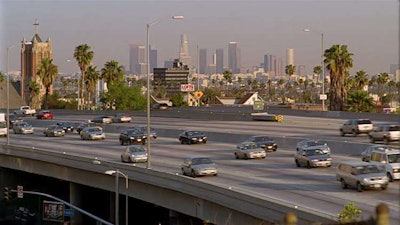 Los Angeles traffic
Los Angeles trafficThe Associated General Contractors has weighed in on the dispute between California and the Trump administration, calling on the U.S. Environmental Protection Agency to delay any cuts to highway funding to the state.
AGC officials say cutting funding would put at risk “the livelihood of thousands of construction workers and the success of hundreds of construction employers.” Cutting funds to the state would also undermine the Clean Air Act that the EPA says it is protecting by its threat.
“Using federal highway funding as a cudgel is counterproductive to the administration’s promise to deliver on infrastructure and the environment,” said Jimmy Christianson, AGC vice president of government relations, in a letter to EPA Administrator Andrew Wheeler. “We urge the agency to work with California on air quality and to provide a grace period sufficient to allow the state to update and finalize its plans.”
On Monday, Wheeler sent a letter to the California Air Resources Board (CARB) that implied that highway funding could be cut for the state’s failure to meet deadlines for plans for the EPA to approve to reduce air pollution.
The EPA letter comes after CARB reached a voluntary agreement in July with Ford, Honda, BMW and Volkswagen to achieve a minimum of 50 miles per gallon fuel economy for cars by 2026, which would be stricter than reductions the Trump administration plans to announce. In retaliation, the administration said it would revoke the state’s ability to set emissions standards above what the federal government allows. The state then announced it would sue the administration. The EPA upped the ante with its letter threatening to cut funding and delay new source permits.
Christianson said cutting highway funding would make it more difficult for California officials to “make environmentally beneficial infrastructure upgrades.”
“AGC supports the agency’s stated commitments to improve air quality and to reduce the backlog in state implementation plans,” Christianson said. “However, a loss of funding would only penalize the very communities the Clean Air Act was intended to protect.”










